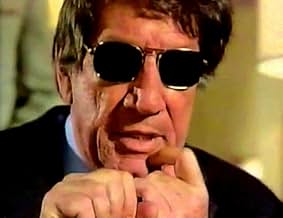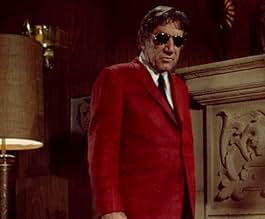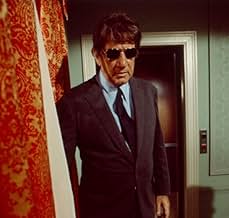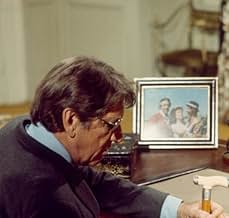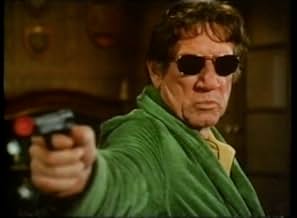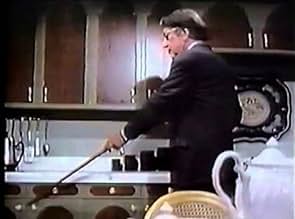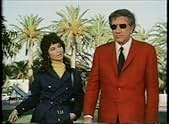A blind actor discovers his wife is cheating on him with his best friend, and hatches a plot to murder them both.A blind actor discovers his wife is cheating on him with his best friend, and hatches a plot to murder them both.A blind actor discovers his wife is cheating on him with his best friend, and hatches a plot to murder them both.
Dan Spelling
- Teenager
- (as Daniel Spelling)
Frank Bello
- Sgt. Wilkes
- (uncredited)
Barbara Dodd
- Mother
- (uncredited)
Jack Riley
- Cab Driver #3
- (uncredited)
- Director
- Writer
- All cast & crew
- Production, box office & more at IMDbPro
6.8286
1
2
3
4
5
6
7
8
9
10
Featured reviews
Worthy Early 70s Crime Drama
Must disagree with the previous reviewer, who apparently only accepts Ingmar Bergman and Fellini as art and can't appreciate a good meat and potatoes thinking man's thriller when he sees it. IN BROAD DAYLIGHT isn't Fellini but it is definitely a suspenseful and rewarding early 70s crime drama featuring a memorable turn by Richard Boone as a blind man who pretends to be sighted in order to kill his philandering wife. Solid cast includes the timeless Stella Stevens, Suzanne Pleshette and Whit Bissell, all of whom turn in good performances. Perhaps there aren't the requisite car chases and gunplay associated with typical 70s crime drama, but this quieter revenge story is still absorbing and compelling from start to finish. More than anything, though, this is a character study of Boone's blind man coping with the realization of his betrayal and coldly calculating how to transform his helplessness and hatred into advantage and revenge. The clever premise is bolstered by real tension throughout and a satisfying Ulmeresque Detour-like ending, despite the previous reviewer's odd dismissal.
This was actually a TV-movie produced by Aaron (LOVE BOAT, CHARLIE'S ANGELS, MELROSE PLACE, etc.) Spelling before he took up the lowest common denominator jiggly soap opera / action adventure mantle which built his 250-room Palace of Versailles in Beverly Hills. Too bad Aaron didn't continue down this darker, less commercial but more intriguing road, which tells the bleak story of a bright man who refuses to live his life in the dark. Spelling might not have built his huge palace making movies like this, but he'd certainly still have wound up with a couple ten bedroom mansions and a beach house, and we'd have a far superior filmography to enjoy. 8.5 /10
This was actually a TV-movie produced by Aaron (LOVE BOAT, CHARLIE'S ANGELS, MELROSE PLACE, etc.) Spelling before he took up the lowest common denominator jiggly soap opera / action adventure mantle which built his 250-room Palace of Versailles in Beverly Hills. Too bad Aaron didn't continue down this darker, less commercial but more intriguing road, which tells the bleak story of a bright man who refuses to live his life in the dark. Spelling might not have built his huge palace making movies like this, but he'd certainly still have wound up with a couple ten bedroom mansions and a beach house, and we'd have a far superior filmography to enjoy. 8.5 /10
Framed!
This is very much like a Columbo episode. Clocking in at 73 minutes, it was written by Larry Cohen, who later penned quite a few Columbo episodes. If you are a youngster and don't know who Columbo was, he was a raincoat wearing TV cop who looks at the less obvious suspect and wears them down with his "Just one more thing..." questions and his annoying quirky presence until the murderers trap themselves.
Richard Boone plays an actor, Tony Chappel, who recently went blind and is leaving some institute where he has been recovering and relearning basic skills as a blind person. He is being allowed to leave five days early and with his own full time therapist - somebody to help him continue learning how to adapt. This person is played by Suzanne Pleshette. If you have your calculator out and find this sounds all very expensive, first off Chappel was apparently a very successful actor and thus very rich, and plus healthcare costs have grown far faster than the rate of inflation this past fifty years.
On the way home Tony asks the therapist, Kate, if he can stop by his lawyer's apartment and get something without her assistance. He even knows the desk drawer. She relents. Tony actually does find his way up to the apartment and lets himself in with a key that he knows is hidden outside. Once inside, he hears his wife Elizabeth (Stella Stevens) and his lawyer in the bedroom doing bedroomy things with her talking about how exciting he is and what a drag it will be having to take care of Tony once he gets home. Tony leaves undetected but pretends to his therapist that he got lost and never got into the apartment. He immediately and secretly plans to murder his wife by shooting her and set up his attorney for the crime. But how can a blind man shoot anybody? Watch and find out.
Just like in Columbo, relationships are not deeply probed. The focus is on Tony and how he arranges everything to pull off the perfect crime. I've never seen Boone in much but "Have Gun Will Travel" and he did command my attention throughout. As an actor, Tony effectively and continually misleads everybody about both minor and major details and never lets on to his wife that everything between them is anything but perfect.
After the crime, which happens rather ironically itself, "an inspector calls" - John Marley as Lt. Bergman. Marley is rather bland in this part but he is methodical and thorough. But the important thing is from the beginning, he suspects Tony, in spite of evidence that the attorney did do it and that Tony is blind. Suzanne Pleshette, in spite of being second billed, does not have that much to do here.
I'd recommend this. But there is just one thing...never is it revealed HOW Tony became blind. Was it an accident? A disease? It is never mentioned. Also, was Tony's arrest even legal? The aftermath would have made a great episode of Law&Order. It is a very suspenseful made for TV treat and I would recommend it.
Richard Boone plays an actor, Tony Chappel, who recently went blind and is leaving some institute where he has been recovering and relearning basic skills as a blind person. He is being allowed to leave five days early and with his own full time therapist - somebody to help him continue learning how to adapt. This person is played by Suzanne Pleshette. If you have your calculator out and find this sounds all very expensive, first off Chappel was apparently a very successful actor and thus very rich, and plus healthcare costs have grown far faster than the rate of inflation this past fifty years.
On the way home Tony asks the therapist, Kate, if he can stop by his lawyer's apartment and get something without her assistance. He even knows the desk drawer. She relents. Tony actually does find his way up to the apartment and lets himself in with a key that he knows is hidden outside. Once inside, he hears his wife Elizabeth (Stella Stevens) and his lawyer in the bedroom doing bedroomy things with her talking about how exciting he is and what a drag it will be having to take care of Tony once he gets home. Tony leaves undetected but pretends to his therapist that he got lost and never got into the apartment. He immediately and secretly plans to murder his wife by shooting her and set up his attorney for the crime. But how can a blind man shoot anybody? Watch and find out.
Just like in Columbo, relationships are not deeply probed. The focus is on Tony and how he arranges everything to pull off the perfect crime. I've never seen Boone in much but "Have Gun Will Travel" and he did command my attention throughout. As an actor, Tony effectively and continually misleads everybody about both minor and major details and never lets on to his wife that everything between them is anything but perfect.
After the crime, which happens rather ironically itself, "an inspector calls" - John Marley as Lt. Bergman. Marley is rather bland in this part but he is methodical and thorough. But the important thing is from the beginning, he suspects Tony, in spite of evidence that the attorney did do it and that Tony is blind. Suzanne Pleshette, in spite of being second billed, does not have that much to do here.
I'd recommend this. But there is just one thing...never is it revealed HOW Tony became blind. Was it an accident? A disease? It is never mentioned. Also, was Tony's arrest even legal? The aftermath would have made a great episode of Law&Order. It is a very suspenseful made for TV treat and I would recommend it.
entertaining
This was a great script from the prolific Larry Cohen, who wrote episodes for "Columbo," "Arrest and Trial" (a forerunner of "Law and Order") and episodes for Kraft Suspense Theater and "The Defenders." He has also written feature films.
I'd love to see this film again - I wish it would come out on video. It stars Richard Boone as a newly-blinded actor and Suzanne Pleshette as his teacher. Though the Boone character puts on a big show for Pleshette of refusing to accept his blindness, he coldly and calculatedly trains himself to act as a seeing man so that, in disguise, he can get rid of his wife and her lover.
It's a suspenseful story, a fascinating character-study and all around great entertainment. For some reason, this kind of TV movie fare has gone out of style and been replaced by women at risk films, rather slow-moving versions of Robin Cook and Mary Higgins Clark novels and the like. But we mystery buffs old enough to remember the '70s remember - with nostalgia - this kind of film.
I'd love to see this film again - I wish it would come out on video. It stars Richard Boone as a newly-blinded actor and Suzanne Pleshette as his teacher. Though the Boone character puts on a big show for Pleshette of refusing to accept his blindness, he coldly and calculatedly trains himself to act as a seeing man so that, in disguise, he can get rid of his wife and her lover.
It's a suspenseful story, a fascinating character-study and all around great entertainment. For some reason, this kind of TV movie fare has gone out of style and been replaced by women at risk films, rather slow-moving versions of Robin Cook and Mary Higgins Clark novels and the like. But we mystery buffs old enough to remember the '70s remember - with nostalgia - this kind of film.
Excellent 70's Thriller
I saw this in the 1970's and recently viewed it again...it is still enjoyable. Richard Boone is great as a blind actor who plots revenge on his unfaithful wife played by Stella Stevens. Suzanne Pleshette and John Marley also play key roles. There is lots of suspense and LA scenes.
Did you know
- TriviaA potential remake with Andrea Bocelli was planned, but didn't work out in the end.
- Quotes
Anthony Chapel: A funny thing happened on the way to the murder.
- ConnectionsReferences Mary Poppins (1964)
Details
- Release date
- Country of origin
- Language
- Also known as
- Am hellichten Tag
- Filming locations
- Pacific Coast Highway, Malibu, California, USA(Tony Chappel in disguise walks onto the '84 bus east')
- Production companies
- See more company credits at IMDbPro
- Runtime
- 1h 15m(75 min)
- Color
- Aspect ratio
- 1.33 : 1
Contribute to this page
Suggest an edit or add missing content

